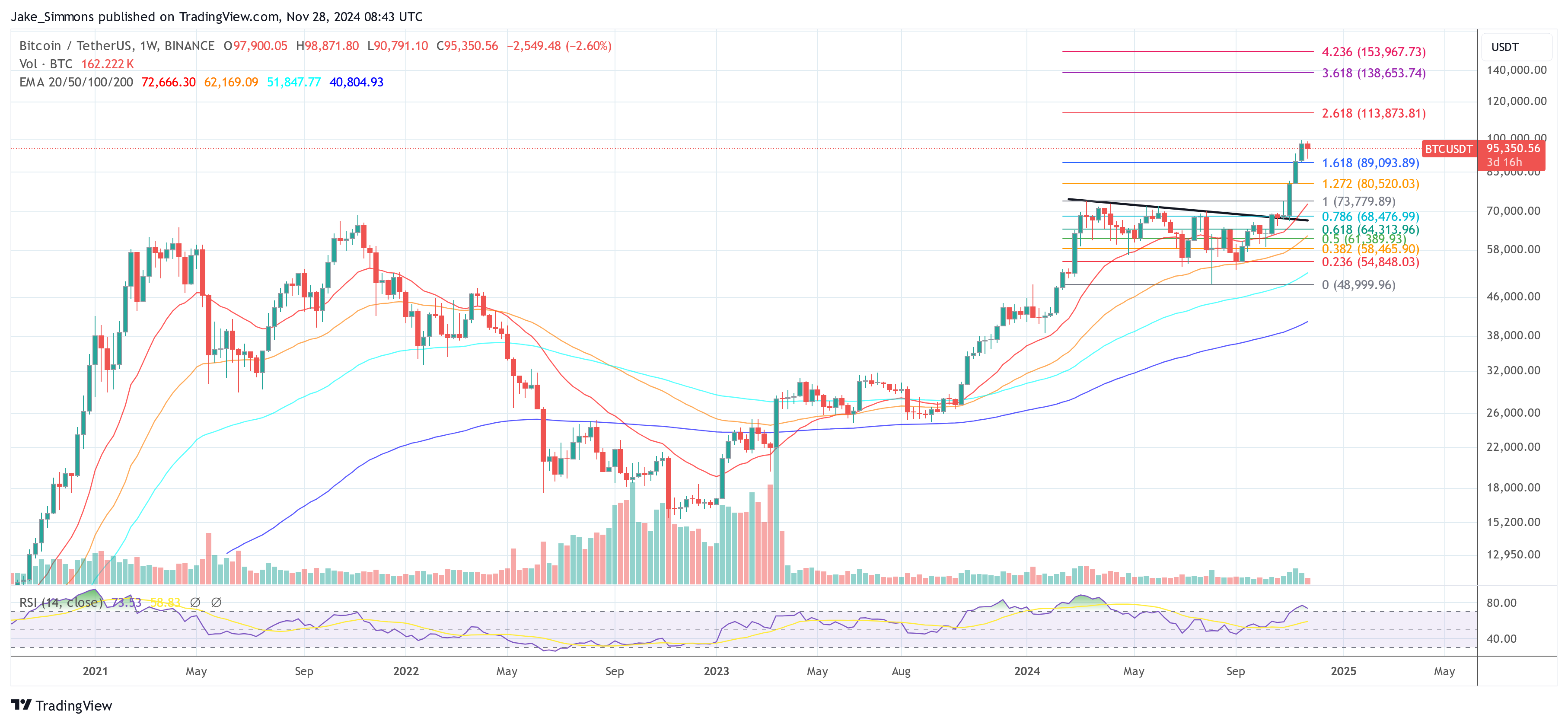In an interview with Mario Nawfal, Jan van Eck, CEO of $118 billion global asset manager VanEck, offered an analysis of Bitcoin’s potential trajectory, the US fiscal deficit, and the broader financial markets. Contrary to some hyper-bullish forecasts, van Eck provided a more conservative price target for Bitcoin for this bull run.
Van Eck stated, “Our thesis is effectively that Bitcoin will keep to the halving cycle, so we’re looking at sort of $150,000 to $180,000 this cycle as a price target.” He dismissed the notion that Bitcoin could reach $400,000 in the current cycle, suggesting that such a milestone might be achieved in the next cycle. “In the next cycle, it reaches my target of half the value of gold, so $400,000 plus depending on the price of gold,” he added.
Discussing the US fiscal deficit, van Eck identified it as “the elephant in the room” and a significant concern for the markets. “We are spending money that’s just completely unsustainable, and for any other country, they’d be headed towards bankruptcy,” he remarked.
He outlined two prevailing schools of thought in Washington regarding fiscal policy. The first is the lobbyist perspective, which asserts that it’s impossible to cut spending significantly, resulting in minimal slowing of growth in the budget deficit. The second is the “extreme disruptors” approach, advocating for a $500 billion cut in government spending.
Van Eck credited this figure to Vivek Ramaswamy, co-head of the Department of Government Efficiency (DOGE), stating, “They can effectuate that because there are 1,200 programs that are no longer authorized but still spending money, which means that they can terminate them with an executive order.” He described this target as “healthy” and “realistic,” although acknowledging it would not close the entire deficit, which was $1.8 trillion last year.
Addressing the market’s reaction to the election of President Trump, van Eck found it peculiar that despite a clear electoral outcome, there remains uncertainty about fiscal policy. “We had a sweep by one political party, yet we don’t really know what their fiscal policy is gonna be,” he observed.
He noted that the initial market reaction was negative for gold because of the possibility of government restructuring. “The initial reaction was negative gold because the idea was, wow, maybe they will be able to restructure government. Never bet against Elon, right?” he said.
Van Eck also commented on geopolitical tensions, particularly the situation in Ukraine and the approval of long-range missiles striking deep into Russian territory. While acknowledging that such events can impact markets, he cautioned, “The problem is geopolitical stuff is completely uninvestable. We never know what next headline is coming, and we don’t know if it’s going to be bullish or bearish.” He advised that professional investors often choose to “do absolutely nothing” in response to geopolitical uncertainties.
Catalysts For Bitcoin Price
On the subject of institutional interest in Bitcoin and regulatory shifts, van Eck emphasized that the regulatory environment plays a crucial role. “It really depends on the regulatory environment,” he said. He pointed out that while regions like Asia have seen regulators giving the green light, the US has been relatively quiet. However, he noted a recent uptick in interest: “Now, with the new regime, suddenly the phone is ringing.”
Van Eck revealed his personal investment stance, stating, “That’s why I have a huge personal investment in Bitcoin and gold.” He expressed optimism about Bitcoin’s maturation process, likening it to a child growing up: “I would say it’s sort of like a teenager, and what gets it to mature is new investor sets coming in.” He noted that while individual investors have embraced Bitcoin ETFs, the wealth management industry has yet to fully engage.
Addressing the correlation between Bitcoin and traditional markets, particularly the NASDAQ, van Eck admitted concern: “The thing that worried me the most […] Bitcoin’s correlation to the NASDAQ was high.” He explained that this high correlation made Bitcoin less attractive to professional investors who were already overexposed to mega-cap tech stocks. However, he remains hopeful that Bitcoin’s correlation will diminish: “Rooting for and expecting that its correlation will go back to zero, which it has been for the long term.”
At press time, BTC traded at $95,350.
 BTC price recovers above $95,000, 1-week chart | Source: BTCUSDT on TradingView.com
BTC price recovers above $95,000, 1-week chart | Source: BTCUSDT on TradingView.comFeatured image created with DALL.E, chart from TradingView.com

















 English (US) ·
English (US) ·